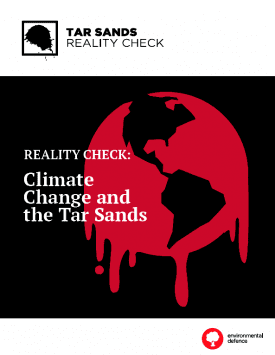

About The Report:
Big Oil is spending millions of dollars trying to greenwash the tar sands, Canada’s fastest growing source of greenhouse gas pollution. A new report, Reality Check: Climate Change and the Tar Sands, sets the record straight on industry claims when it comes to global warming pollution.
The report counters claims by industry and industry-affiliated groups about the impacts of the tar sands on our shared climate and on Canada’s climate goals.
The tar sands are already Canada’s fastest growing source of global warming pollution. Current plans for tar sands expansion, including new pipelines like Northern Gateway, Keystone XL and Energy East, are based on a misguided assumption that the world won’t take climate change seriously, and will continue on a catastrophic path towards six degrees of global warming.
As industry continues to tout its expansion plans, long-promised regulations to control tar sands pollution are nowhere to be seen despite being promised by five environment ministers over six years. Recently, Prime Minister Stephen Harper indicated a further delay when he said he hopes regulations are completed over “the next couple of years.”
Meanwhile, both government and industry have spent hundreds of millions of dollars on slick public relations campaigns in attempts to convince Canada’s largest trading partners that the environmental challenges of the tar sands are under control. TV and magazine ads plastered across the country as well as in the United States and Europe claim the tar sands are not significantly more polluting than other fuels, and that Canada is taking serious action on climate change. Nothing could be further from the truth. It is time for a much-needed reality check about these false assertions.
Fortunately for our shared climate, Canadians and our trading partners are starting to see through the greenwashing. With growing demands for climate action across the country, the continent and the world, Canada needs to stop clinging to last century’s dirty fuels and instead turn its attention to cleaner, smarter energy, which is better for the economy and our climate.
(Adobe Reader is required to read this pdf report. Please ensure you have the latest version.)




